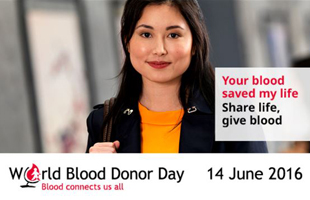
On World Blood Donor Day, the World Health Organization (WHO) Western Pacific Region honours those who have saved countless lives by donating blood—the gift of life. "Blood connects us all" is the theme of this year's commemoration, which highlights the bond between regular donors and the people whose lives they saved. On this occasion, WHO reiterates its call for increased voluntary and unpaid blood donation, and encourages regular donors to continue to give.
"Demand for blood continues to grow faster than supply, a fact that makes safe blood more precious than ever," said Dr Shin Young-soo, WHO Regional Director for the Western Pacific. "I strongly encourage all countries in the Region to support national blood systems in creating stable bases of voluntary, unpaid donors who can regularly give blood to save millions of lives," he added.
Every second, someone in the world needs blood for surgery, trauma, severe anaemia or complications of pregnancy. The decision to donate your blood can save a life, or more if blood is separated into its components—red cells, platelets and plasma.
Transfusion of blood and blood products help patients suffering from life-threatening conditions live longer with a higher quality of life. Blood transfusion is one of the key life-saving interventions in hospitals that provide surgical and comprehensive emergency care.
In high-income countries, transfusion is most commonly used for supportive care in cardiovascular surgery, transplant surgery, massive trauma, etc. In low- and middle-income countries, transfusion is used more often to manage pregnancy-related complications and severe childhood anaemia.
Regular donations are needed to ensure that safe blood will be available whenever and wherever it is needed, because blood can only be stored for a limited time.
WHO supports Ministries of Health in addressing blood safety and availability issues through the Organization's Blood and Transfusion Safety programme. WHO also supports countries in developing national systems to ensure timely access to safe and sufficient supplies of blood and blood products and good transfusion practices.
WHO's Blood and Transfusion Safety programme assists countries in ensuring universal access to safe blood and blood products and achieve self-sufficiency in safe blood and blood products, through voluntary unpaid blood donation.
WHO recommends that every country put in place policies, systems and structures to ensure the safety, quality, accessibility and timely availability of blood and blood products. The Organization also recommends mandatory screening of donors for infections and diseases such as HIV, hepatitis B and C, and syphilis.




